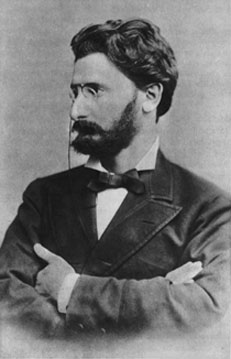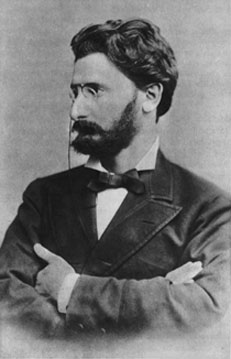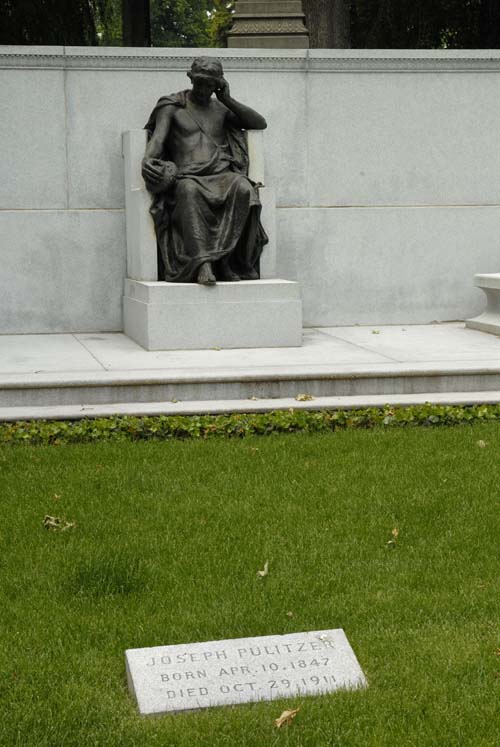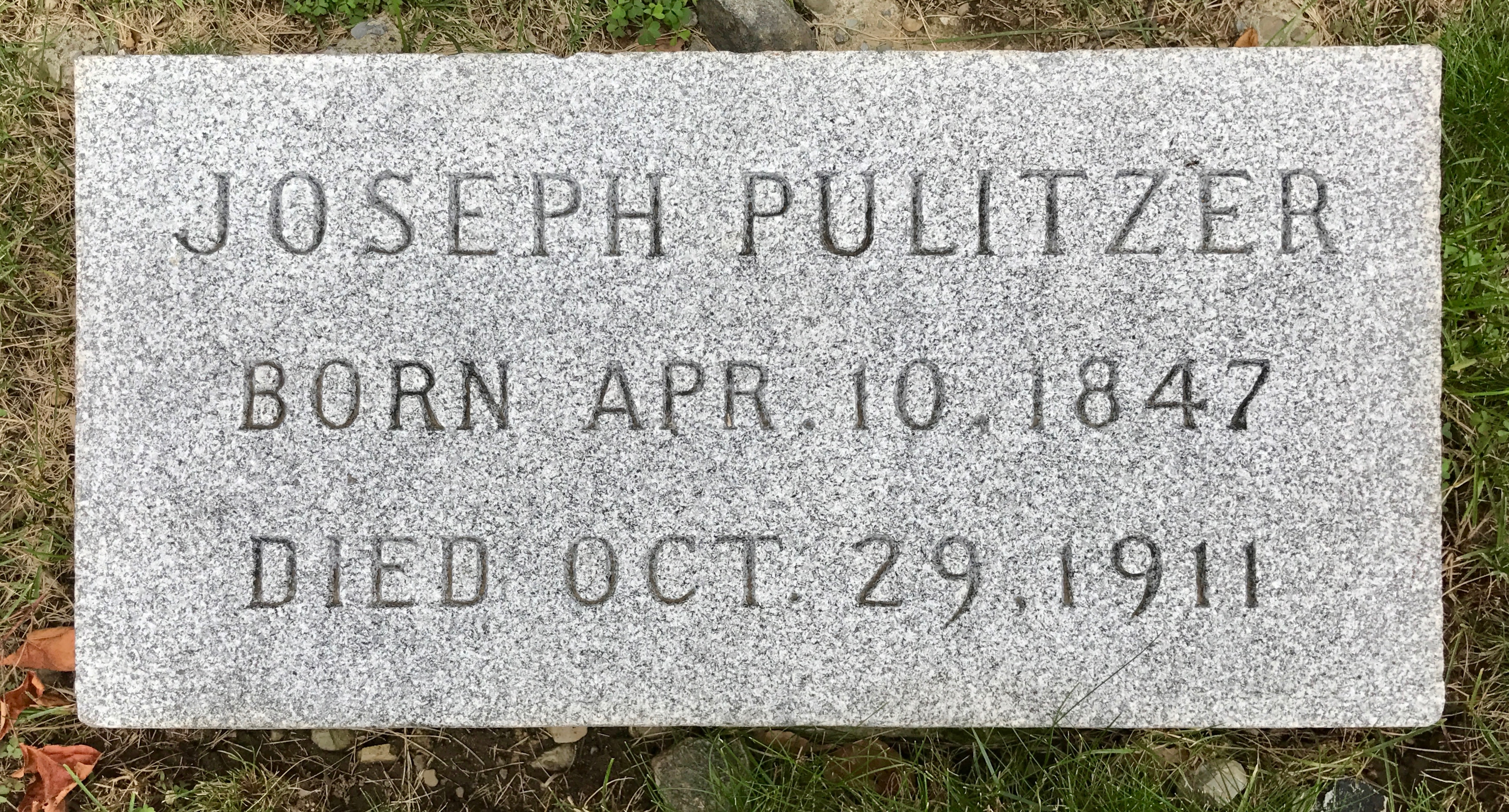Along with William Randolph Hearst, Pulitzer created a new and controversial style of American journalism, dedicated to crusading on the side of people and as a spokesman for democracy. Previously the press usually spoke for the establishment and moneyed interests, but this new strain of journalism supported labor, attacked trusts and monopolies, and exposed scandal, fraud, and corruption, both public and private. At a time when journalism was not considered a respectable way of earning a living, Pulitzer was committed to raising the standards of the profession.
Joseph Pulitzer was born in Mako, Hungary, the eldest son of a prosperous Jewish grain merchant. He was educated in private schools in Budapest. After unsuccessful attempts to join the military, in 1864, he emigrated from Hungary to the United States, landing at Castle Garden practically penniless. The Austrian Army had rejected him for his weak eyesight, and the French Foreign Legion did not want him, but when he got to America, the Union Army was not so choosy. He served as a Private in Company I, 1st New York Volunteer "1st Lincoln" Cavalry from November 1864 until the end of the Civil War.
After the war, he settled in St. Louis, where he worked as a mule tender, waiter, and hack driver before studying English and law at the Mercantile Library. In 1868, he was recruited by Carl Schurz for his German-language daily, the "Westliche Post" where he excelled as a reporter. He participated in politics and was admitted to the bar, but he practiced only a short time.
Pulitzer joined the Republican Party and was elected to the Missouri State Assembly in 1869. In 1872, he was able to purchase the "St. Louis Post" for $3,000. This venture was a success, and, six years later, was able to buy the "St. Louis Dispatch" for $2,700. He combined the two newspapers and launched crusades against government corruption, lotteries, gambling, and tax fraud. In 1874, he was admitted to the bar in Washington, D.C., where he also worked as a correspondent for the "New York Sun."
By 1883, Pulitzer was a wealthy man and was able to purchase the "New York World" for $346,000 from financier Jay Gould. The newspaper, which had been losing $40,000 a year, was transformed into the first tabloid-style journal that concentrated on human-interest stories, scandal, and sensational material. Pulitzer also promised to use the paper to "expose all fraud and sham, fight all public evils and abuses, and to battle for the people with earnest sincerity." In 1885, he was elected as a Republican to represent New York's 9th Congressional District in the United States House of Representatives, but he resigned a year later in 1886.
Two years later he founded the "Evening World" in New York. At the age of 40, he had become essentially blind, but still continued to run his press empire for 22 more years. In the 1890s, Pulitzer had a circulation war with William Randolph Hearst. Using strong headlines, sensational news events, cartoons, and other means, they especially tried to attract working-class readers and immigrants. The "World" increased its circulation with a comic supplement, and, in 1895, the first full-page original 'Yellow Kid' cartoon in color appeared, created by the cartoonist R. F. Outcault. Pulitzer continued to promote investigative reporting, and, in 1909, the "New York World" exposed a fraudulent payment of $40 million by the United States to the French Panama Canal Company. The federal government indicted Pulitzer for criminally libeling President Theodore Roosevelt and the banker John Pierpont "J.P." Morgan. However, Pulitzer won an important victory for the freedom of the press when the courts dismissed the indictments.
Pulitzer died of heart failure aboard his yacht, the "Liberty," on October 29, 1911. Through his will, he left $2 million to establish the Columbia University School of Journalism, and, following the example of Alfred B. Nobel, he established a foundation to award annual Pulitzer Prizes for literature, drama, music, and journalism. Since 1922, Pulitzer Prizes have also been awarded for cartoonists.
Along with William Randolph Hearst, Pulitzer created a new and controversial style of American journalism, dedicated to crusading on the side of people and as a spokesman for democracy. Previously the press usually spoke for the establishment and moneyed interests, but this new strain of journalism supported labor, attacked trusts and monopolies, and exposed scandal, fraud, and corruption, both public and private. At a time when journalism was not considered a respectable way of earning a living, Pulitzer was committed to raising the standards of the profession.
Joseph Pulitzer was born in Mako, Hungary, the eldest son of a prosperous Jewish grain merchant. He was educated in private schools in Budapest. After unsuccessful attempts to join the military, in 1864, he emigrated from Hungary to the United States, landing at Castle Garden practically penniless. The Austrian Army had rejected him for his weak eyesight, and the French Foreign Legion did not want him, but when he got to America, the Union Army was not so choosy. He served as a Private in Company I, 1st New York Volunteer "1st Lincoln" Cavalry from November 1864 until the end of the Civil War.
After the war, he settled in St. Louis, where he worked as a mule tender, waiter, and hack driver before studying English and law at the Mercantile Library. In 1868, he was recruited by Carl Schurz for his German-language daily, the "Westliche Post" where he excelled as a reporter. He participated in politics and was admitted to the bar, but he practiced only a short time.
Pulitzer joined the Republican Party and was elected to the Missouri State Assembly in 1869. In 1872, he was able to purchase the "St. Louis Post" for $3,000. This venture was a success, and, six years later, was able to buy the "St. Louis Dispatch" for $2,700. He combined the two newspapers and launched crusades against government corruption, lotteries, gambling, and tax fraud. In 1874, he was admitted to the bar in Washington, D.C., where he also worked as a correspondent for the "New York Sun."
By 1883, Pulitzer was a wealthy man and was able to purchase the "New York World" for $346,000 from financier Jay Gould. The newspaper, which had been losing $40,000 a year, was transformed into the first tabloid-style journal that concentrated on human-interest stories, scandal, and sensational material. Pulitzer also promised to use the paper to "expose all fraud and sham, fight all public evils and abuses, and to battle for the people with earnest sincerity." In 1885, he was elected as a Republican to represent New York's 9th Congressional District in the United States House of Representatives, but he resigned a year later in 1886.
Two years later he founded the "Evening World" in New York. At the age of 40, he had become essentially blind, but still continued to run his press empire for 22 more years. In the 1890s, Pulitzer had a circulation war with William Randolph Hearst. Using strong headlines, sensational news events, cartoons, and other means, they especially tried to attract working-class readers and immigrants. The "World" increased its circulation with a comic supplement, and, in 1895, the first full-page original 'Yellow Kid' cartoon in color appeared, created by the cartoonist R. F. Outcault. Pulitzer continued to promote investigative reporting, and, in 1909, the "New York World" exposed a fraudulent payment of $40 million by the United States to the French Panama Canal Company. The federal government indicted Pulitzer for criminally libeling President Theodore Roosevelt and the banker John Pierpont "J.P." Morgan. However, Pulitzer won an important victory for the freedom of the press when the courts dismissed the indictments.
Pulitzer died of heart failure aboard his yacht, the "Liberty," on October 29, 1911. Through his will, he left $2 million to establish the Columbia University School of Journalism, and, following the example of Alfred B. Nobel, he established a foundation to award annual Pulitzer Prizes for literature, drama, music, and journalism. Since 1922, Pulitzer Prizes have also been awarded for cartoonists.
Bio by: Edward Parsons
Family Members
Advertisement
See more Pulitzer memorials in:
Records on Ancestry
Sponsored by Ancestry
Advertisement













